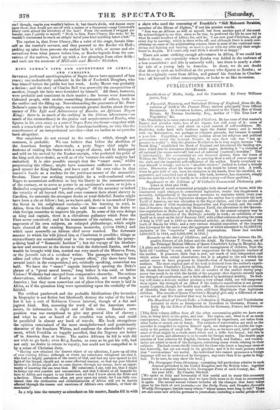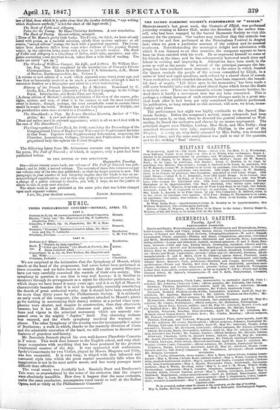PUBLICATIONS RECEIVED.
Boons.
Recollections of Malta, Sicily, and the Continent. By Penry Williams junior, Esq.
A Financial, Monetary, and Statistical History of England, from the Re- volution of 1688 to the Present Time; derived principally from Official Documents. In Seventeen Letters, addressed to the Young Men of Great Britain. By Thomas Doubleday, Esq , Author of " The True Law of Population," &c. [Mr. Doubleday is to some extent a pupil of Cobbett. He has some of that master's fluency and peculiar style; less of his vigour, but still some of it: some of Cobbett's strong terms; and about an equal amount of self-confidence. Mr. Doubleday looks back with fondness upon the feudal times; and is wroth with the Reformation, not perhaps on religious grounds, but because it caused a poor-law. Forgetting, or knowing nothing about the religious and political persecutions under the restored Stuarts, he says their rule was " not op- pressive in reality": with the glorious Revolution be is very angry, because " the Dutch King " established the Bank of England and introduced the funding sys- tem; which last he denounces through whole pages, declaring it " a violation of all national [he means natural] law cud all national [natural) morality." This is introductory. His commentary on our financial system, from the times of William the Third to the present day, is amusing from a sort of coarse vigour in the style and the impudent self-sufficiency of the author. Nearly everybody ex- cept himself is wrong; and he is " absolute wisdom " clothed in rather a homely guise. Discussion about his views or his work would be labour lost. A truth, when he gets hold of one, loses its character in his hands, from his onesided, ex- aggerated, and conceited cast of mind. The book, however, has character, simply from the activity—for it is hardly to be called energy—of these qualities.] Supplement to the Editions of .2IPCulloch's Commercial Dictionary pub- lished in 1844 and 1846.
[The advance of sound commercial principles both abroad and at home, with the consequent rapid changes in commercial legislation, render this Supplement a necessity, independently of the natural accession to statistics which every year produces. In the class of legislative changes the author has to chronicle the new Tariff of America, our last alteration in the Sugar-duties, and (for the edition of 1844) the Acts of 1845 regulating Importation and Exportation, and the condi- tion of Seamen; the changes in the Mexican Tariff; the alterations in the Quaran- tine-regulations at Malta and in Portugal, &c. In the annual category may be mentioned, the statistics of the Railways actually in work; an exhibition of our Tariff as it stood on theist of January 1847, with added columns showing the rates of duty in 1787 and in 1819 on the retained articles; an elaborate account of the trade of Russia for 1844; and a very carious detailed exposition of the imports into Liverpool for the same year, the aggregate of which amounted to 24,538,0131. exclusive of the "coastwise" and Irish importations. These last reached 5,318,9571. in 1844, and 6,383,4981. in 1815.] Remarks on the Diet of Children; and on the Distinctions between the Di-
gestive Powers of the Infant and the Adult. By George T. Gream, one of
the Principal Medical Officers of Queen Charlotte's Lying-in Hospital, &c. [A plain and sensible treatise on the diet and management of children, from the birth till "teething" is over, with some suggestions for the hygienic conduct of the mother. It possesses little that is new, nor much of that independent cast which arises from actual observation; but it is adapted to the end, which the author seems to have proposed to himself—that of furnishing a manual for mothers. The most original part of the book is deduced from the author's experi- ence at Queen Charlotte's Lying-in Hospital. Contrary to the general opinion, Mr. Gream does not think that the diet or comfort of the mother during preg- nancy has much to do with the health of the progeny: that depends entirely upon her strength of constitution, and is little affected by accidental debility. No feed- ing will make a delicate mother produce a very robust child, nor will temporary want injure the strength of an infant if the mother's constitution is not perma- nently impaired, though her health may suffer. Ile also demurs to the conclusion of Quetelet that there are many more still-born illegitimate than legitimate children. The records of Queen Charlotte's Hospital give only a difference of one or two out of any five hundred that may be taken.] The Handbook of Travel-Talk: a Collection of Dialogues and Vocabularies intended to serve as Interpreter to Travellers in Germany, France, or Italy. By the Editor of the Handbooks for Germany, France, and Switzer- land.
[This little volume differs from all the other conversation-guides we have ever seen, in being brief, to the point, and real. The topics, and, what is of as much consequence, the treatment, have been suggested by experience, not taken from other books or struck out by fancy. The subjects of conversation are such as the traveller is compelled to express himself upon, not dialogues to exhibit his inge- nuity or his powers of small talk. They are also, as we have said, brief: perhaps some of them might be a shade more direct and a trifle less formal; but this is matter of taste, and allowance is to be made for foreign modes. The double page consists of four columns for English, German, French, and Italian; and vocabu- laries are added to most of the dialogues, containing many words relating to their subjects. The book seems chiefly intended for those who know a language more or less learnedly, but are not ready in its practice; and it is for such persons alone that " conversations" are useful. An individual who cannot pronounce a foreign language will not be understood by foreigners, any more than if he spoke in Eng- lish. fo be sure, he may show the book.] The Newspaper Press Directory: containing full particulars relative to each Journal published in the United Kingdom and the British Isles: together with a complete Guide to the Newspaper Press of each County, &c. For the year 1847. By Charles Mitchell
[We spoke so fully and favourably of this useful and to many this necessary manual on its first appearance, that we have little more to do than to recommend
it again. The second annual volume includes all the changes that have taken place by the birth of new journals,—as the Daily News, and Douglas Jerrold's Weekly Newspaper, besides many others "whose names were long to tell." There are also some new articles germane to journalism; including a useful precis of the
law of libel, from which it is quite clear that the jocular definition, " any writing which displeases anybody," is soil far short of the legal truth.] The Book of Fable and Allegory.
Tales for the Young. By Hans Christian Andersen. A new translation. • The Book of Poetry. Second edition, enlarged. [Three of Mr. Burns's pretty little books. The Poetry, we think, we have already noted with praise, as a tasteful selection, chiefly from modern authors: at all events, "second edition " stamps the book with a practical approval.. The trans- lation from Andersen differs from some other editions of this popular Danish writer, by the selection being made with a view to juvenile readers. The Book of Fable and Allegory is a miscellany of fables, short tales, anecdotes, and alle-
'es containing some practical lesson, taken from a Wide field of reading. The kt; are nicely "getup."]
The Works of William Cowper, his Life, and Letters. By William Hay- ley, Esq. Now first completed by the introduction of Cowper's Private , Correspondence. Edited by the Reverend T. S. Grimshawe, AIL, Rector of Barton, Northamptonshire, &c. Volume I.
[A reissue or new edition of a work which appeared some dozen years ago, and was then so favourably received as to reach a second edition, although it had to encounter Southey as a biographer and editor in a.rival undertaking.]
History of the French Revolution. By J. Michelet. Translated by C. Clocks, B.L., Professor (Brevete) of the English Language in the College Royal. Introduction, and Books First and Second. [A cheap edition of Michelet's striking exhibition of his view of the causes, prin- ciples, actions, and men, of what it is the custom to call the most wonderful event in history; though, perhaps, the most remarkable event in modern times would be nearer the truth. Michelet has all the forceful manner of Carlyle, and the peculiarities seem more natural to a Frenchman.] The Hunchback; a Play. By James Sheridan Knowles, Author of "Vir- ginias," &c. A new and revised edition. [Neat and rather novel in ontward appearance; which is all we need deal with in the case of The Hunchback..] • The Congregational Year-Book, for 1846.: containing the Proceedings of the Congregational Union of England and Wales and its Confederated Societies in that Year. Together with Supplementary Information, respecting the Churches, Associations, Colleges, Ministers, and Publications of the Con- gregational body throughout the United Kingdom.
The following letter from Mr. Atherstone corrects our impression as to his poem, The Fall of Nineveh; of which, it appears, only a part had been published before.
TO THE EDITOR OF THE SPECTATOR.
Haymarket, Tuesday.
Sin-About twenty years back, one volume of The Fall of Nineveh was pub- lished; and in 1830, a second volume. The contents of these two volumes occupy one volume only of the two just published; so that the larger portion is new. The paragraph in your number of last Saturday implies that the whole is but an un- acknowledged republication; and as this may perhaps be considered as involving a charge of a paltry attempt to deceive, you will, I hope, do me the justice to allude to this in your next number.
The whole work is now published at the same price that was before charged upon each separate volume.



























 Previous page
Previous page